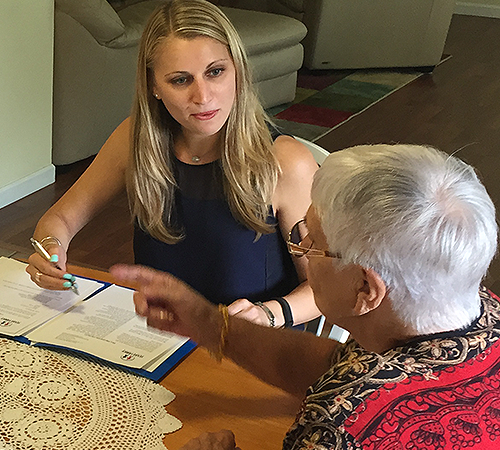Caring.com, a popular website that bills itself as an “online destination for caregivers seeking information and support as they care for aging parents, spouses, and other loved ones,” has released the results of a study on senior driving behavior, and the results are shocking.
Elderly Drivers Are More Dangerous Than You Might Think
July 9, 2015 — by Collin Woodard • cheetsheet.com
 Source: Thinkstock
Source: Thinkstock
Caring.com, a popular website that bills itself as an “online destination for caregivers seeking information and support as they care for aging parents, spouses, and other loved ones,” has released the results of a study on senior driving behavior, and the results are shocking.
Based on the results of a study conducted by Princeton Survey Research Associates International, it appears that elderly drivers were responsible for as many as 14 million traffic incidents in the past 12 months. Despite the frequency of elderly drivers causing crashes, most other people were concerned more with distracted drivers, teen drivers, and drunk drivers.
Interestingly, those who are 65 and over are most likely to consider elderly drivers more of a danger on the road than drunk drivers. Even though they’re more aware than any other group that continuing to drive becomes increasingly hazardous as they age, it’s not always clear to either their families or them when that time has come.
To dig a little deeper, I talked with Caring.com’s CEO Andy Cohen about the results of the study. Over the phone, Cohen said that even he was surprised at how high the accident rate was for senior citizens. The study included incidents that occurred without injury, but even so, 14 million per year is a very high number.
One issue he highlighted is that doctors rarely want to get involved in the decision making process, potentially to prevent legal liability issues, so even though 21% of elderly drivers would like their doctors to tell them when it’s time to give up the keys, the decision almost always falls on family members to make the decision.
Laws that govern how often senior citizens need to to be retested in order to keep their drivers licenses also vary widely from state to state. Some require it every year, while others only require it every five years. Only 10% of seniors want the government telling them when they have to give up the keys, but driving ability can drop drastically in just a few years.
“It’s a large growing issue, and it really falls to the adult children to deal with it because doctors and law enforcement don’t want to deal with it,” said Cohen.
 Source: Thinkstock
Source: Thinkstock
He also believes that modern safety technology can help elderly drivers hold onto their keys longer. They may not necessarily trust the new features they’ve never used before, but for a lot of older drivers, if they have to choose between upgrading their car or giving up driving all together, they’ll choose the new car. It isn’t wise to encourage someone who truly shouldn’t be driving to keep doing so even if they have a brand new car, but having that safety net in place can definitely prolong the amount of time it’s safe for a lot of people to drive.
When adult children feel like it’s gotten to the point that they have to have the talk with their parents about giving up the keys for good, it’s important that they know it’s normal to be uncomfortable bringing it up. In a past Caring.com and National Safety Council survey, 40% of adults said they were more comfortable talking about funeral arrangements with their parents than they were driving.
The best thing to do, though, is to present concerns in a loving and thoughtful way and encourage them to make the decision to stop driving for themselves. “Driving is often associated with independence and freedom, which is why many senior citizens are reluctant to give up their car keys,” said Cohen.
If you can acknowledge their need for independence and develop a plan to make sure they don’t feel abandoned or trapped in their own home, elderly drivers are much more likely to voluntarily give up their keys. Cohen pointed out that many states offer free ride share options for senior citizens that can help them get out of the house without needing to drive.
Modern ride sharing services like Uber can also help senior citizens get around more easily and cheaply than calling for a cab. Cohen did say, though, that even if they can afford to have a car take them somewhere they want to go, a lot of elderly people may still resist doing so because they want to save their money. If that’s the case, sending a pre-paid ride to take them to an activity you know they’ll enjoy can work well.
Talking to elderly parents about driving is definitely intimidating, but the consequences of not bringing it up are serious. Elderly drivers might not get as much attention as distracted drivers or drunk drivers, but they’re certainly still dangerous. Having a hard conversation with your parents is never fun, but for their sake and for the sake of the other people they may injure, it’s worth it.
Read the article here:
http://www.cheatsheet.com/automobiles/elderly-drivers-are-more-dangerous-than-you-might-think.html/?a=viewall#ixzz3gC3vlrxh









Follow Us!